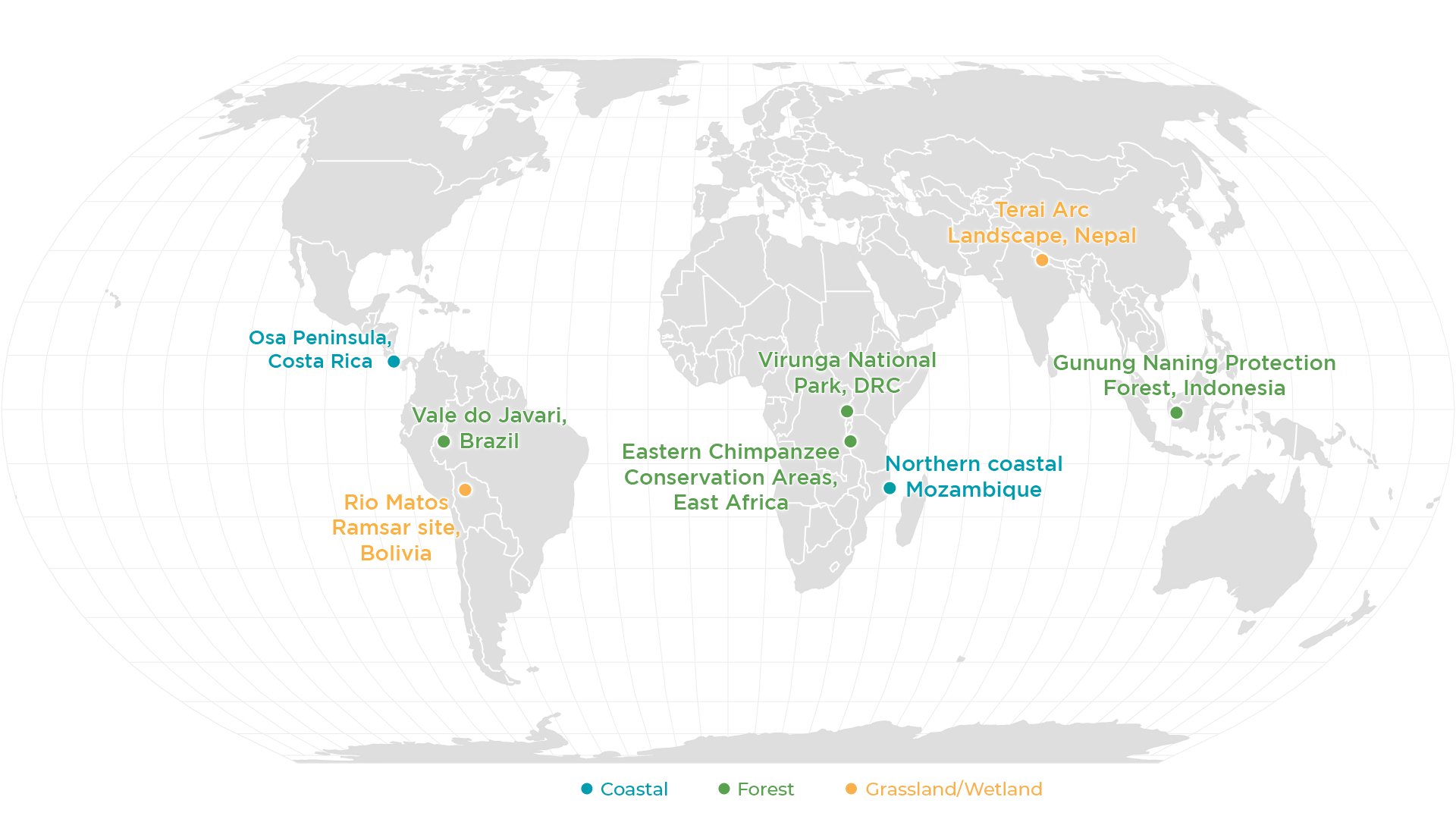Planet Launches Project Centinela, Equipping the World’s Leading Biodiversity Scientists and Conservationists with the Latest Satellite-derived Tools and Insights
These eight vulnerable, high-biodiversity locations are the first sites for Project Centinela, implemented in collaboration with local site teams. Credit: Business Wire
Planet Labs PBC (NYSE:PL), a leading provider of daily Earth data and insights, today launched Project Centinela , a new program aiming to equip the world’s leading biodiversity scientists and conservation advocates with an unprecedented array of high-resolution, high-frequency satellite imagery, analytics, and Planetary Variables. As part of Planet’s mission, over the next three years the program will help support teams working at the forefront of the biodiversity crisis to monitor and safeguard up to 50 of the world’s vulnerable biodiversity hotspots.
Planet owns and operates the largest constellation of Earth imaging satellites in history, capturing the Earth on a near-daily cadence. This high-frequency satellite imagery enables communities and researchers to see Earth’s changing surface, characterize ecosystem health, and track the success of conservation and restoration efforts over time. With access to Planet’s Planetary Variables, such as Forest Carbon, Soil Moisture, and Land Surface Temperature, Project Centinela participants will have a unique suite of tools to derive quantifiable insights that advance conservation of their target sites.
“Time is of the essence. Ecosystems around the world are in peril, and we risk losing some of Earth’s most iconic species. We now have the tools to tackle the biodiversity crisis at speed and scale,” said Planet Chief Impact Officer Andrew Zolli. “Leveraging daily satellite data and modern AI, we can monitor critical hotspots and tackle threats before it’s too late. The biggest challenges remain around access to this data, and Project Centinela is leading the way in getting these game-changing tools into the hands of scientists and stewards around the world.”
At its onset, Project Centinela has already engaged teams in eight biodiversity-vulnerable locations across the globe including: the Osa Peninsula in Costa Rica, Vale do Javari in Brazil, Rio Matos Ramsar site in Bolivia, Virunga National Park in the Democratic Republic of the Congo, Eastern Chimpanzee Conservation Areas in western Tanzania and Uganda, northern coastal Mozambique, Terai Arc Landscape in Nepal, and Gunung Naning Protection Forest in Borneo, Indonesia.
“In the hands of communities, decision makers, and researchers, Planet's powerful imagery and tools help us see Earth's changing surface, characterize ecosystem and biodiversity conditions, and track the success of conservation and restoration efforts over time,” said Amy Rosenthal, Planet's Senior Global Director for Conservation Initiatives.
Institutions from these sites are already accessing these data to better advance their work:
Microsoft AI For Good Research Lab
"Tracking and detecting deforestation is essential for preserving our planet's biodiversity. We are proud to collaborate with Planet Labs, which stands out for its unique ability to provide daily, high-resolution satellite data that is critical to this mission. Their unparalleled capabilities enable crucial conservation efforts, and together we support the courageous staff at Virunga National Park in their vital work." - Juan M. Lavista Ferres, Corporate Vice President and Chief Data Scientist at Microsoft and Director of the Microsoft AI For Good Lab.
Planet’s Planetary Variables will provide new insights into chimpanzee habitats and threats, a core area of focus at the Jane Goodall Institute. “Through this partnership, JGI will support implementation of the Uganda National Chimpanzee Conservation Strategy and Tanzania Chimpanzee Conservation Action Plan. Forest carbon, soil moisture, crop biomass and other products will help enable our local communities and government partners to better monitor and manage their land use plans and protected areas, from village land and local authority forest reserves to National Parks, supporting their livelihoods and contributing towards conservation of the most vulnerable biodiversity hotspots.” - Dr. Lilian Pintea, VP Conservation Science, Jane Goodall Institute.
“I am very proud of the JGI partnership with Planet because supporting solution-oriented teams with powerful technology tools is critical to addressing the existential threats to the health of the planet that all life depends upon.” - Dr. Jane Goodall, founder of the Jane Goodall Institute and UN Messenger of Peace.
“WildMon equips front-line conservationists with a tech ecosystem to measure the impact of their actions on biodiversity, reducing the reliance on external experts. By leveraging Planetary Variables—key environmental and climatic data crucial to biodiversity health—we are excited to contribute to Project Centinela. We will explore how Planet’s data can enhance community-led decision making in Borneo, enabling Indigenous Peoples (IPs) and Local Communities (LCs) to strengthen the conservation work they are already leading.” - Chrissy Durkin, President & Chief Development Officer, WildMon.
“As a ground-up NGO working in the tropics, it's challenging to gather the type of actionable data, at both large geographical and fine temporal scale, that we need to guide our conservation actions and to monitor the impacts of our restoration efforts on the landscape. This project will allow us to assess that impact and guide our conservation plans into the future. And that is critical for us and our local partners to showcase how ground-up efforts can have major environmental impact and uplift, translating actions into results for partners, donors, and maybe someday, investors." - Dr. Andrew Whitworth, Executive Director, Osa Conservation.
As a Public Benefit Corporation (PBC), Planet’s mission is to accelerate humanity toward a more sustainable, secure, and prosperous world, by illuminating environmental and social change. Project Centinela advances Planet’s mission as part of its contributions to support the Kunming-Montreal Global Biodiversity Framework.
